 Petzlover
Petzlover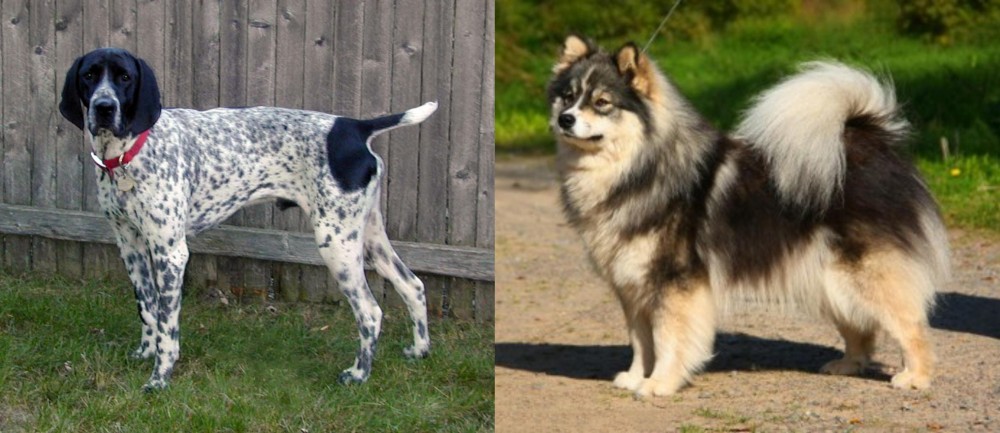 Braque d'Auvergne is originated from France but Finnish Lapphund is originated from Finland. Braque d'Auvergne may grow 13 cm / 6 inches higher than Finnish Lapphund. Braque d'Auvergne may weigh 38 kg / 84 pounds more than Finnish Lapphund. Both Braque d'Auvergne and Finnish Lapphund has almost same life span. Braque d'Auvergne may have more litter size than Finnish Lapphund. Braque d'Auvergne requires Low Maintenance. But Finnish Lapphund requires Moderate Maintenance
Braque d'Auvergne is originated from France but Finnish Lapphund is originated from Finland. Braque d'Auvergne may grow 13 cm / 6 inches higher than Finnish Lapphund. Braque d'Auvergne may weigh 38 kg / 84 pounds more than Finnish Lapphund. Both Braque d'Auvergne and Finnish Lapphund has almost same life span. Braque d'Auvergne may have more litter size than Finnish Lapphund. Braque d'Auvergne requires Low Maintenance. But Finnish Lapphund requires Moderate Maintenance
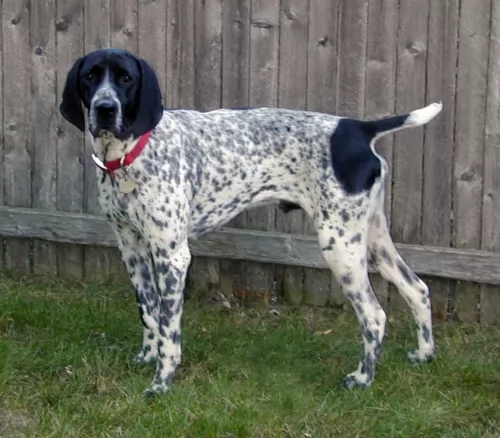 Sometime over 5 centuries ago, in the Cantal Region of France, was born a hunting breed, that might be the real ancestor of today’s pointing hunter dogs. Perhaps the oldest of all pointing gun dog is the Braque d’Auvergne. This breed comes from Central France in the region of Auvergne. This breed was developed prior to written dog breeding records in order to hunt in this region and find, point, flush out and retrieve fowl. This breed is clearly one of if not the oldest breeds in the French Braque. There is no agreement among historians on what breed is the oldest of the European pointing dogs and where they were developed – was it Spain or was it France? It is thought that the Braque Francais Gascogne is the original one of these in the early 1600’s while the Braque d’Auvergne came soon after. Due to the different hunting needs in the different parts of France, the Braque Francais Gascogne was crossed with a lot of other local scent hounds. The Braque d’Auvergne is one of the very oldest of all of these. There are records of the breeds existence in the 1700’s. It is probable that the Braque d’Auvergne was developed by crossing local dogs with Gascogne as well as with the Petit Bleu de Gascogne and the Grand Bleu de Gascogne.
Sometime over 5 centuries ago, in the Cantal Region of France, was born a hunting breed, that might be the real ancestor of today’s pointing hunter dogs. Perhaps the oldest of all pointing gun dog is the Braque d’Auvergne. This breed comes from Central France in the region of Auvergne. This breed was developed prior to written dog breeding records in order to hunt in this region and find, point, flush out and retrieve fowl. This breed is clearly one of if not the oldest breeds in the French Braque. There is no agreement among historians on what breed is the oldest of the European pointing dogs and where they were developed – was it Spain or was it France? It is thought that the Braque Francais Gascogne is the original one of these in the early 1600’s while the Braque d’Auvergne came soon after. Due to the different hunting needs in the different parts of France, the Braque Francais Gascogne was crossed with a lot of other local scent hounds. The Braque d’Auvergne is one of the very oldest of all of these. There are records of the breeds existence in the 1700’s. It is probable that the Braque d’Auvergne was developed by crossing local dogs with Gascogne as well as with the Petit Bleu de Gascogne and the Grand Bleu de Gascogne.
In all of Western Europe, the region of Auvergne is not very populated and has unique geography in that is hilly and has many extinct and eroded volcanoes. A lot of the region is still unpopulated. In this environment, wildlife has flourished, and hunting is successful in providing food for the regions people. This circumstance with an abundance of birds, led to the breeding of the Braque Auvergne to specialize in hunting in this area. The breed is not very popular outside of Auvergne and probably never was. That fact allowed them to be devastated by the Second World War. The Reunion des Amateurs de Braque d’Auvergne (RABA) was started to promote the pure breeding and the protection of the d’Auvergnes. But when Auvergnes was occupied during the war, the slowed breeding of the Braque d ‘ Auvergne almost eliminated the breed. There might have only been about 25 dogs left following the end of the war. These remaining dogs were used to revive the breed, but it is still uncommon, but not rare. Individuals have been imported by other countries including North America. The United Kennel Club (UKC) accepted the breed in 2006 but is not accepted by the AKC (American Kennel Club). The breed is still a working breed and outside of France, very rare.
 Known also as the Lapinkoira, Lapponian Shepherd Dog or Finish Lapland Dog, it is believed that the Finnish Lapphund is an ancient dog breed, dating back way back to 7000 B.C.
Known also as the Lapinkoira, Lapponian Shepherd Dog or Finish Lapland Dog, it is believed that the Finnish Lapphund is an ancient dog breed, dating back way back to 7000 B.C.
The breed had its origins as a reindeer herder with the Sami people, being both herder and protector. In Finland, the first breed standards for the dog were set in 1945 by the Finnish Kennel Club. They called the dog the Lappish Herder.
The first American litter was born in 1988 and it was in 1994 that the breed was recognized by the United Kennel Club, becoming a recognized breed in the Herding Group in 2011.
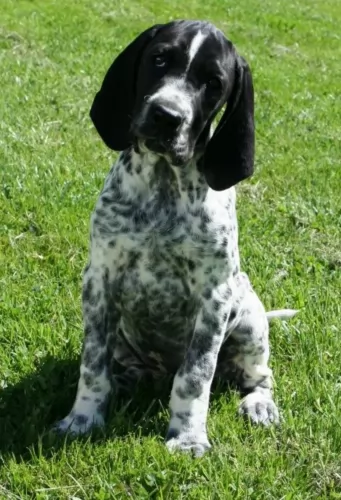 The Braque d’Auvergne is a well built, strong hunting dog with long ears, a large head and a docked tail. His coat is white with black markings and black ears and head. The breed looks a lot like all the other pointing dogs from France. They are medium in stature and has the appearance of a working gundog. He is athletic, muscular and fit. Docking the tail is outlawed in many countries and all of the United Kingdom. In that case the tail is high on the rump and always straight. Their face and head are big for the size of the body and shaped like an oval. With a long muzzle, deep set eyes and a gentle expression, they are kindly and handsome dogs. Their skin is loose but not droopy or wrinkled like hound dogs.
The Braque d’Auvergne is a well built, strong hunting dog with long ears, a large head and a docked tail. His coat is white with black markings and black ears and head. The breed looks a lot like all the other pointing dogs from France. They are medium in stature and has the appearance of a working gundog. He is athletic, muscular and fit. Docking the tail is outlawed in many countries and all of the United Kingdom. In that case the tail is high on the rump and always straight. Their face and head are big for the size of the body and shaped like an oval. With a long muzzle, deep set eyes and a gentle expression, they are kindly and handsome dogs. Their skin is loose but not droopy or wrinkled like hound dogs.
 Looking quite a bit like the Samoyed, Siberian Husky or Australian Shepherd, the Finnish Lapphund stands at between 40 and 52cm and weighing 15 to 24kg.
Looking quite a bit like the Samoyed, Siberian Husky or Australian Shepherd, the Finnish Lapphund stands at between 40 and 52cm and weighing 15 to 24kg.
The Finnish Lapphund is a medium sized dog with a friendly, sweet face.He has a beautiful soft cuddly kind of coat that is medium to long in length and essentially straight. The dense undercoat provides insulation and shouldn’t be trimmed.The dog comes in different colors such as tan brown, yellowish and black. The ears are erect and the tail is bushy, curling over the back.
One characteristic of this dog which can irritate some people is that he has a tendency to bark. This characteristic of his makes him a good watch dog though. He is a friendly dog who wants to do the right thing, and training and socialization can ensure that he is always obedient and amicable.
Intelligent and alert, your pet is an intelligent dog and training him won’t prove to be difficult.It is a dog which craves companionship from his human family and he wants to be included in all his family’s activities. He wants to accompany you on all your running- and cycling activities. He gets on well with children in the home with his gentle nature, being a particularly friendly breed.
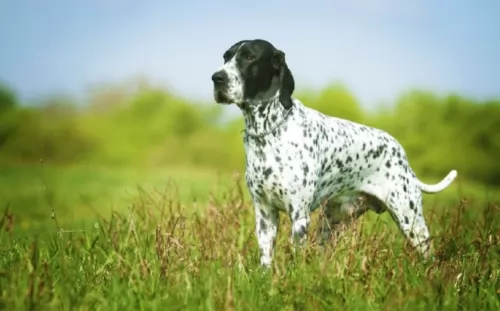 This is a gentle, adaptable and obedient breed. With their intelligence and affectionate nature, they make great family dogs and are eager to please their people. Living with other dogs is fine but not with small, prey size animals. The Braque d’Auvergne should never be left alone pets like gerbils and hamsters. They must be socialized to cats as pets and not prey before living with them successfully. They need to work closely with one human partner. They are first and foremost a hunting dog and need some sort of hunting simulation. They are devoted to their families and want to be constantly in their presence. This can lead to separation anxiety if they are left alone too much. They are great with children and need a family.
This is a gentle, adaptable and obedient breed. With their intelligence and affectionate nature, they make great family dogs and are eager to please their people. Living with other dogs is fine but not with small, prey size animals. The Braque d’Auvergne should never be left alone pets like gerbils and hamsters. They must be socialized to cats as pets and not prey before living with them successfully. They need to work closely with one human partner. They are first and foremost a hunting dog and need some sort of hunting simulation. They are devoted to their families and want to be constantly in their presence. This can lead to separation anxiety if they are left alone too much. They are great with children and need a family.
 The Finnish Lapphund is an active and alert dog who just loves to fuss around his human family. He has many good qualities that make him the perfect family pet. It is why he is often referred to as an all-rounder.
The Finnish Lapphund is an active and alert dog who just loves to fuss around his human family. He has many good qualities that make him the perfect family pet. It is why he is often referred to as an all-rounder.
He is a calm, friendly non-aggressive dog who wants to be co-operative with his owners. He has the tendency to bark. With a friendly, happy face, he is essentially just a big teddy bear and if you treat him well he is going to make sure that he showers you with his special love and loyalty.
 The Braque d’Auvergne is a healthy breed but can face some of the same health concerns as other pointers and hunting dogs. The long, droopy ears can get infected easily if wet and need to be cleaned regularly so that food or dirt are not trapped their either. Because of the small gene pool however they may be at risk for several issues. The breeders in France express concerns about possible hip dysplasia and testing is highly recommended. Because they are at risk for other conditions that might not show up until later in life, it is also recommended that they be tested by the Canine Eye Registration Foundation (CERF) as well as the Orthopedic Foundation for Animals (OFA).
The Braque d’Auvergne is a healthy breed but can face some of the same health concerns as other pointers and hunting dogs. The long, droopy ears can get infected easily if wet and need to be cleaned regularly so that food or dirt are not trapped their either. Because of the small gene pool however they may be at risk for several issues. The breeders in France express concerns about possible hip dysplasia and testing is highly recommended. Because they are at risk for other conditions that might not show up until later in life, it is also recommended that they be tested by the Canine Eye Registration Foundation (CERF) as well as the Orthopedic Foundation for Animals (OFA).
 Regarded as generally healthy, the Finnish Lapphund can reach anything between 12 and 14 years of age. There are however one or two common dog illnesses that your Finnish Lapphund might be more prone to and these are hip and elbow dysplasia as well as progressive retinal atrophy.
Regarded as generally healthy, the Finnish Lapphund can reach anything between 12 and 14 years of age. There are however one or two common dog illnesses that your Finnish Lapphund might be more prone to and these are hip and elbow dysplasia as well as progressive retinal atrophy.
While the occurrences of these illnesses is rare, they can happen with your Finnish Lapphund. Whenever you notice something untoward with your pet, get him to the vet immediately.
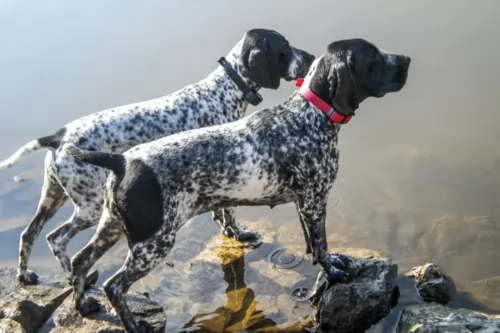 The Braque d’Auvergne needs a high-quality diet fit for a working dog but not too much to make him obese. They are an active breed to choose a formula that is designed for working dogs.
The Braque d’Auvergne needs a high-quality diet fit for a working dog but not too much to make him obese. They are an active breed to choose a formula that is designed for working dogs.
Although no studies have been conducted on the Braque d’Auvergne’s health issues there are many conditions that similar breeds are susceptible to and the d’Auvergne might be as well. This includes any of the following:
This is an active, working dog who needs a lot of stimulation and exercise. The only real appropriate exercise for these dogs is hunting or outings in the woods. He not only needs the exercise, but he also needs to stimulate his sense of smell and his gundog intelligence. He might excel in lure chase or even a form or barn hunt. They certainly could excel at obedience trials and perhaps rally. If you are a weekend hunter then this is the ideal dog for you. They are so easy to train that they surpass other pointers for success with casual hunters. They hunt at a slower pace than many other gundogs. Their intelligence and athleticism lend itself well to agility and flyball also. They need a large (+acres)fenced in area to run and play.
 With his beautiful, thick coat the Finnish Lapphund sheds quite heavily during certain seasons. The double coat will certainly require a good brushing at least twice a week to remove dirt, burrs and grass.
With his beautiful, thick coat the Finnish Lapphund sheds quite heavily during certain seasons. The double coat will certainly require a good brushing at least twice a week to remove dirt, burrs and grass.
All dogs deserve a high quality dog food which is appropriate to the breed, the age of the dog, his size and his activity levels.
You want to ensure that your pet gets all the right vitamins and minerals he requires for good health. If you aren’t sure what to feed your pet on, speak to your vet. Home-made food is always a good idea too as it provides some variety to your pet’s diet. Cooked rice, vegetables and chicken becomes a tasty, nutritious treat when added into his kibble. Also try to add in some raw meat when you can as well to ensure his skin and coat remain healthy. Cool, fresh water is to be supplied night and day non-stop.
Your Finnish Lapphund isn’t the kind of dog who is going to be bounding around you demanding exercise. He is a calm dog with moderate exercise requirements. He will love to join you on a walk every day and some ball games will satisfy him.